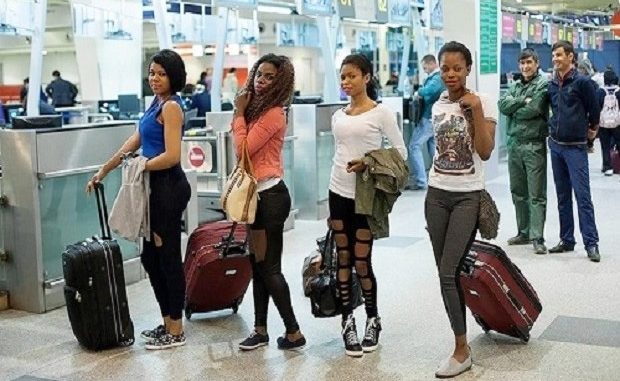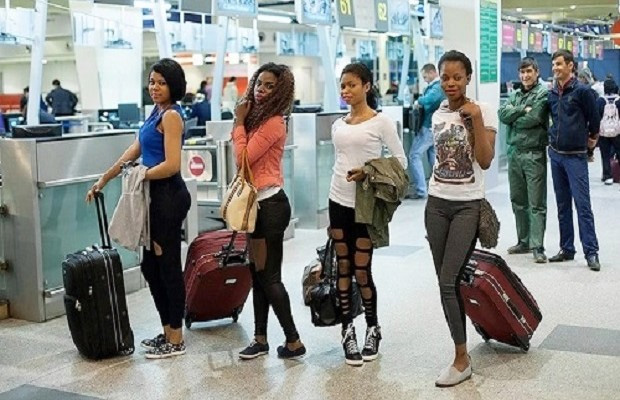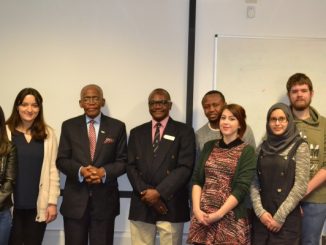
EDITOR’S NOTE : It would appear like governments throughout some West African countries need to arrest and charge criminally-mided individuals describing themselves as RECRUITING AGENTS who are busy fooling young women and sending them into domestic slavery in the Arab states. The reports are pervasive in foreign newspapers and can no longer be ignored .
We bring you two reports of this criminality involving girls from Sierra Leone and Ghana. We will bring you more in subsequent publications .
_______________________________–

Women from Sierra Leone ‘sold like slaves’ into domestic work in Kuwait
Recruitment agents are accused of duping women into working as housemaids, leaving them isolated and abandoned in private households
By Pete Pattisson in Kuwait City
Recruitment agents are accused of duping women into working as housemaids, leaving them isolated and abandoned in private households
A domestic worker in The Avenues shopping mall, Kuwait City. The country has the highest ratio of domestic workers to citizens in the Middle East.
In the basement of an old tower block near Kuwait City, recruitment agents brandish files full of healthy, work-ready domestic workers. “Choose the one you want,” says one agent with a smile. “I will give you a hundred days’ guarantee. If you don’t like her you can send her back.”
In Kuwait the domestic workers business is booming, with nearly 90% of Kuwaiti households employing at least one foreign maid.
Yet while dozens of recruitment agencies are pulling out the stops to attract potential employers – including parading women in front of potential employers who can take them home on the spot – they are also being accused of selling women and duping them into a life of domestic servitude.
Women from Sierra Leone formerly employed as domestic workers in private Kuwaiti households said they had been “sold like slaves” by recruitment agents to families in the Kuwaiti capital and then resold multiple times.
Each said that they had paid about £1,000 ($1,480) to recruitment agents in Sierra Leone on the promise of jobs as nurses in hospitals or in the hotel industry, only to find on arrival that they were to be offered to families as housemaids and expected to work for up to 22 hours a day.
“[The agents] took us to their offices and people would come to look at us,” said one woman who worked as a nurse in Sierra Leone. “If they said, ‘I want this person’, they took you to their house.”
Adama, 24, said that after being selected by a Kuwaiti family she was taken to their house and treated “like a slave”.
“You have to work 24 hours [with] no day off. You can never leave the house … You are not allowed to use mobile phones. These people are not good.”
She raises her skirt to reveal a deeply scarred leg. Adama claims her employer paid her nothing for her work and deliberately spilled hot oil on her while she was cooking. “I was crying, [but] she did not even look at me. I said, ‘Madam, why you do this to me?’ She told me that I’m a slave … I’m too slow, I’m not fast enough.”
Adama, 24, a domestic worker from Sierra Leone, shows the scars on her leg. She says they were caused when her Kuwaiti employer deliberately spilled hot oil on her.
Adama, 24, a domestic worker from Sierra Leone, shows the scars on her leg, which she claims were caused when her Kuwaiti employer deliberately spilled hot oil on her. Photograph: Pete Pattisson
Employers are given a 100-day guarantee by agents, which allows them to return domestic workers they are not happy with and get a refund. As well as keeping employers happy, this also creates a booming “second-hand” market where returned domestic workers can be resold to other families for up to two years.
Thousands of women travel to Kuwait every year to work. Workers come from across Asia but also, increasingly, from Africa, with women being recruited by agents in countries such as Sierra Leone, Cameroon, Kenya and Ethiopia.
Once employed as domestic workers in Kuwait, women find it difficult to leave if they suffer abuse. Under Kuwait’s kafala sponsorship system, domestic workers are not allowed to leave or change jobs without their employer’s permission. With their residency status also tied to their employer, if they run away they become “illegal”.
Last year, stories of abuse suffered by Sierra Leonean women in Kuwait prompted the country’s authorities to follow other governments, including those of Indonesia and Nepal, in banning its citizens from being employed as domestic workers in the country. Yet they continue to come through informal channels.
Despite the official ban, when staff from the Sierra Leonean embassy visited recruitment agents recently they found about 100 women from Sierra Leone on their books. Saidu Bangura, the cultural attache at the Sierra Leone embassy in Kuwait, believes the real figure is “far above that”.
“It’s a total deception,” said Bangura. “Recruitment agents in Kuwait contact agents in Sierra Leone through the internet and ask them to recruit workers. I want to appeal to these women not to believe anyone who wants them to come to Kuwait. It’s only going to bring punishment and distress.”
Once in Kuwait, women often completely disappear from view. Isolated in private households and excluded from Kuwait’s labour rights legislation, they are extremely vulnerable to abuse and exploitation.
It’s a total deception. I want to appeal to these women not to believe anyone who wants them to come to Kuwait
Saidu Bangura, Sierra Leone embassy, Kuwait
Human Rights Watch says that the embassies of labour-sending countries in Kuwait received more than 10,000 complaints from domestic workers in 2009. The grievances included “nonpayment of wages; withholding of passports; excessively long working hours without rest; and physical, sexual, and psychological abuse”.
“The sense of having ‘paid for’ or having ‘bought’ a worker makes some employers feel entitled to treat the worker however they wish,” concludes a 2010 Human Rights report into the abuse of domestic workers in Kuwaiti households.
Kuwait has the highest ratio of domestic workers to citizens in the Middle East, with one domestic worker for every two Kuwaiti citizens, according to the same report. Figures from Kuwait’s population census state there were 246,000 men and women in domestic service in 2005, accounting for 21.9% of total employment in the country, but some estimates put the latest figure at approximately 660,000.
Once in their place of work, many remain hidden behind the closed doors of the vast tan-coloured mansions in the city’s wealthy residential areas. One long-term resident, who didn’t want to be named, said that workers are effectively abandoned once placed with employers.
“The recruitment agents never check on their domestic workers; whether they get food, are able to talk to their family or get a day off,” he said. “They have already got their money, so they never check.”
Rima Kalush, co-director of migrant-rights.org, says that although agents are legally responsible for a domestic worker for the first three months of their contract, in reality – unless an employer has a problem with their worker – checks are rarely made.
“The concept of monitoring domestic work is contested by many governments worldwide, who claim such check-ups would comprise the privacy of the home,” she says. “There are many cases of women disappearing – we’ve received reports from several family members. Sometimes workers are later found, but many cases remain unresolved.”
The profiles of workers from west Africa are presented by a recruitment agent at an office near Kuwait City. The agent said he could acquire a woman from Cameroon within 10 days.
The profiles of workers from west Africa are presented by a recruitment agent at an office near Kuwait City. Photograph: Pete Pattisson
Some of the domestic workers interviewed by the Guardian allege that they have also been mistreated by the agents who are supposed to represent their interests. Adama claims that, after her employer returned her to her agent, she was locked inside a house for three days with no food while her agent tried to find another buyer.
She escaped and sought refuge at the Sierra Leonean embassy, before she was moved to a Kuwaiti shelter for runaway maids, where she joined an estimated 300 former domestic workers awaiting deportation to their home countries. Many of those stuck there has been sent by their embassies, who considered it the best way to help them return.
At the shelter, women find themselves in another type of prison. Under Kuwaiti law, employers are obliged to report any worker who has “absconded” from a private home. Their residency permit is then cancelled and orders are issued to detain and deport them. While the facility is immaculate, with a large outdoor area and spotless corridors, those sheltering here are not allowed to go outside or use mobile phones. They can contact their families, but only on the shelter’s phone, and only at weekends. Women can be trapped here for months, if not years.
Despite promises of reform, the Kuwaiti government has not yet passed a law to protect domestic workers, who are not given the basic labour rights provided to other workers under national law.
“There has been a draft law for domestic workers for a long time, but it has not been passed by parliament,” said Abdul Alghanim, head of the migrant workers office at the Kuwait Trade Union Federation.
Until then, women like Alima, another Sierra Leonean in the government shelter, will continue to suffer in Kuwait. A few weeks after arriving in the country, Alima discovered she was pregnant, but her agent refused to send her home unless her family sent money for the flight, which they could not afford to do.
And so Alima gave birth to her son Richie alone in a Kuwaiti hospital. “I just want to go home,” she sobbed, clutching her three-week-old boy. “I have suffered too much here.”
CULLED FROM THE GUARDIAN NEWSPAPER OF LONDON
____________________________________
Ghanaian Girls Suffer Ordeal In Gulf States
By Daily Guide
Previous | Next
A video showing a girl suspected to be Ghanaian engaged in a forced oral and coital sex with three men bearing American accent currently making the rounds has removed the lid over the ordeal females who migrate to foreign lands especially Arab countries suffer.
The video under review shows a girl who appears to have been constrained to become a prostitute under a certain level of duress falling into the hands of some wicked men.
Angry about her poor showing occasioned by her naivety, they rained obscene insults on her and sexually abused her in the most abominable fashion imaginable.
Many Ghanaian girls who migrate to Gulf countries through employment agencies end up as domestic hands in the residences of unscrupulous rich Arabs who use them as sex objects at the blind side of their wives. A lady who craved for anonymity said there are instances where fathers shared their African sex objects with their children. Women who resist such overtures are subjected to untold physical assaults by their owners as it were.
Unfortunately, many of these girls easily fall for the advertisements about what they stand to gain by taking the bold decision to migrate for the so-called green pastures in the Gulf States of Arabia.
Their travel documents are collected by their bosses as soon as they land in their final destinations where they double as domestic workers and sex slaves.
When DAILY GUIDE reached out to Ghana’s Ambassador to Saudi Arabia, Alhaji Said Sinare on the issue, he expressed worry about the contents of the video but added that he could not tell whether she is a Ghanaian. Many Ghanaian girls, he said, go through untold hardships at the hands of unscrupulous persons in these parts of the world as they ostensibly serve them as domestic house-helps.
Regarding the video as afore-referred to, he said it appears to have taken place in Dubai and the aggressors were Americans.
Since assuming office as Ghana’s envoy in Saudi Arabia, he said, he has been involved in rescuing entrapped Ghanaian girls working as domestic house-helps who have ended up being sex slaves at the disposal of their employers. ‘I am currently preparing to go to Kuwait on a similar mission’ he said.
In a related development, 18 Ghanaian females, according to the Ambassador have been deported by the Saudi authorities in Riyadh.
The deportation of Ghanaian ladies from Saudi Arabia, he said, is worrying to Saudi authorities given the cost involved in their air fares.
Regarding the Ghanaian ladies deported last Monday morning, he said upon receiving a call by the authorities, he sent one of his subordinates to go and find out what was happening only to be told about how they possessed fake travel documents.
‘When I went there they refused to allow me to talk to the ladies’ he said.
By A.R. Gomda



